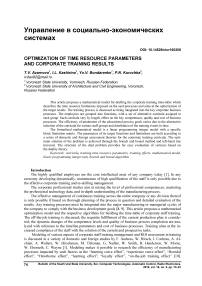Optimization of time resource parameters and corporate training results
Автор: Azarnova T.V., Kashirina I.L., Bondarenko Yu.V., Kurochka P.N.
Рубрика: Управление в социально-экономических системах
Статья в выпуске: 2 т.16, 2016 года.
Бесплатный доступ
This article proposes a mathematical model for drafting the corporate training time-table which describes the time resource limitations imposed on the said processes and aims at the optimization of the target results. The training process is discussed as being integrated into the key corporate business processes. The employees are grouped into functions, with a set of alternative curricula assigned to each group. Such curricula vary by length, effect on the key competences, quality and cost of business processes. The efficiency of attainment of the educational process goals varies due to the alternative selection of the curricula for various staff groups and distribution of the training events in time. The formalized mathematical model is a linear programming integer model with a specific block limitation matrix. The parameters of its target functions and limitations are built according to a series of domestic and foreign assessment theories for the corporate training curricula. The optimum solution of the problem is achieved through the branch and bound method and left-hand tree traversal. The structure of the dual problem provides for easy evaluation of vertexes based on the duality theory.
Curricula, training time resource parameters, training effects, mathematical model, linear programming integer task, branch and bound algorithm
Короткий адрес: https://sciup.org/147155118
IDR: 147155118 | УДК: 519.6 | DOI: 10.14529/ctcr160208
Список литературы Optimization of time resource parameters and corporate training results
- Lukicheva L.I. Upravlenie intellektual'nym kapitalom: uchebnoe posobie . Moscow, Omega-L Publ., 2008. 552 p.
- Morgunov V.M. Effekt obuchenija na proizvodstve: ekonomicheskij i matematicheskij analiz . Moscow, LAP Lambert Academic Publ., 2012. 120 p.
- Barkalov S.A., Galinskaya E.V., Ivashchenko A.A., Novikov D.A. . Journal of Voronezh State University of Technology, 2005, v.1, issue 10, pp. 82-86. (un Russ.)
- Azarnova T.V., Ukhin A.L. . Management Systems and Information Technologies, 2015, vol. 61, iss. 3-1, pp. 100-105. (in Russ.)
- Azarnova T.V., Ukhin A.L. . Management System Economics and Management, 2015, vol. 16, iss. 2.2, pp. 214-221. (in Russ.)
- Bondarenko Yu.V., Bereznev P.V. . Management Systems and Information Technologies, 2012, iss. 2 (48), pp. 62-64. (in Russ.)
- Kashirina I.L., Ukhin A.L. . Journal of Voronezh State University of Construction and Architecture. Series: Construction Management, 2015, iss. 2 (7), pp. 229-235. (in Russ.)
- Kurochka P. N., Simonenko A.N., Cherednichenko N.D. . Technology and the Organization of Construction Production, 2013, no. 4 (5), pp. 46-48. (in Russ.)
- Barkalov S.A., Kurochka P.N., Mikhin M.P., Mikhin P.V. . Voronezh, 2012.
- Boucher T.O. Some Implications of Learning Theory for Assembly Line Design and Labor Productivity. Engineering Costs and Production Economics, 1987, vol. 11, no. l, pp. 31-38.


